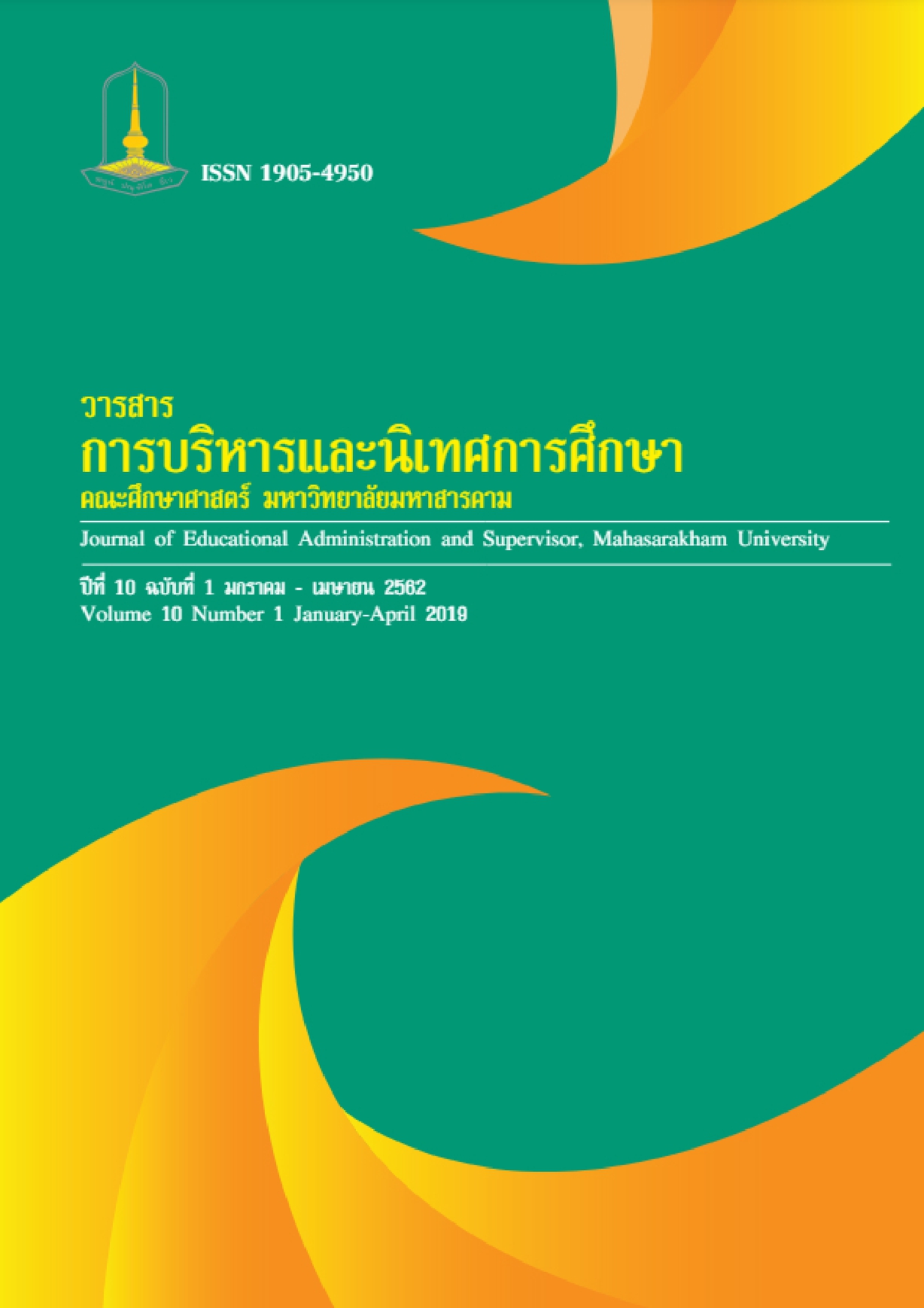Guideline of Learning Activities Based on Happiness School Concepts: A Case Study of Anuban Chantarat School
Main Article Content
Abstract
The purpose of this research were to (1) study, summarize and evaluate guideline for learning activities of the happiness school. (2) study the satisfied of guideline for learning activities of the happiness school. Purposive sampling for target groups include 3 expert for evaluate guideline for learning activities and 42 person which 7 the Executive Committee and 35 teachers of Anuban Chantarat School, Kalasin Province, under The Office of the Private Education Commission Ministry of Education . Research Method were studying the documents to define the concept and operation of the happiness school. In the first semester of the academic year 2018. Data were analyzed using mean values. Standard deviation and percentage.
The results of the research were as follows:
1. The concept of the happiness school was composed of 5 concepts: (1) Technological Pedagogical andContent Knowledge:TPACK) (2) Content and Language Integrated Learning (CLIL) (3) Community-Based Learning (CBL) (4) Problem-Based Learning (PBL) and (5) Jitsuksa system. The learning activities based on happiness school conceptswas “The PROM model” had 4 stages, including: (1) planning (P: Plan) (2) Learning from the experience with real life or real situation (R: Real life) (3) advanced practitioners (O: Operation) (4) M: Monitor and reflection in their learning. The model had IOC according 0.67-1.00 and appropriate at high level (x̄ = 4.25, S.D. = 0.90)
2. The satisfaction with the guideline for learning activities of the happiness school at the hight level (x̄ = 4.19, S.D. = 0.55)
Downloads
Article Details
References
กัมพล เจริญรักษ์. (2558). เรื่องเล่าเส้นทางการพัฒนาโรงเรียนสุขภาวะ: โรงเรียนแห่งความสุข. วารสารวิชาการ, 18(2): เมษายน – มิถุนายน 2558, 38-51.
คณะทำงานวิชาการ ภาคีเพื่อการศึกษาไทย. (2561). เส้นทางอนาคตการศึกษาไทย. กรุงเทพฯ: ภาคีเพื่อการศึกษาไทย Thailand Education Partnership (TEP).
คณะศึกษาศาสตร์. (2561). สาระการอบรม หลักสูตรการพัฒนาครูในโครงการผลิตครูเพื่อพัฒนาท้องถิ่นระยะการเข้าสู่วิชาชีพ (Induction Period) รุ่นปี พ.ศ. 2559–2560 ของเครือข่ายภาคตะวันออกเฉียงเหนือตอนล่าง. มหาสารคาม: คณะศึกษาศาสตร์ มหาวิทยาลัยมหาสารคาม. (อัดสำเนา)
ชวลิต ชูกำแพง. (2560). ชุมชนแห่งการเรียนรู้ของครู. วารสารการวัดผลการศึกษา มหาวิทยาลัยมหาสารคาม, 23(2): 1-6.
ปริญา ปริพุฒ. (2559). การพัฒนารูปแบบการเรียนรู้ตามแนวคิดการเรียนรู้ส่วนบุคคลเพื่อส่งเสริมความเป็นผู้เรียนรู้อย่างเชี่ยวชาญ. วิทยานิพนธ์ ปร.ด. มหาวิทยาลัยมหาสารคาม, มหาสารคาม.
มูลนิธิสถาบันวิจัยระบบการศึกษา. (2561). โรงเรียนสุขภาวะ: การศึกษาแบบนวัตกรรมยุคใหม่ (Healthy School),สืบค้นเมื่อ17 พฤศจิกายน 2561, จากhttp://www.ires.or.th
โรงเรียนอนุบาลจันทรัตน์. (2560). รายงานผลการประเมินคุณภาพการศึกษา ปีการศึกษา 2560. กาฬสินธุ์: โรงเรียนอนุบาลจันทรัตน์. (อัดสำเนา)
วิเชียร ไชยบัง. (2561). จิตศึกษากับการพัฒนาปัญญาภายใน. พิมพ์ครั้งที่ 5. มหาสารคาม: อภิชาติการพิมพ์.
สำนักงานเลขาธิการสภาการศึกษา. (2560). แผนการศึกษาแห่งชาติ พ.ศ. 2560-2579. กรุงเทพฯ: พริกหวานกราฟฟิค.
Bray, B. and McClaskey, K. (2015). Make Learning Personal. California: Corwin.
Stein, S. (2001). Equipped for the Future Content Standards: What Adults Need to Know and Be Able to Do in the 21st Century. 3nd ed. Washington, D.C.: National Institute for Literacy.
Walker, K. (2011). Play Matters: Investigative Learning for Preschool to Grade 2. 2nd ed. Victoria: ACER Press.


